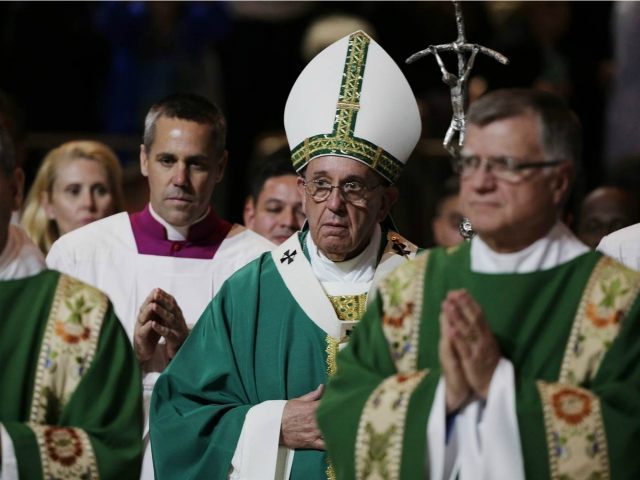Pope Francis warns marriage has been stretched and distorted in the United States, to the point where it is no longer even similar to the Christian sacrament of matrimony.
The pontiff noted the “unprecedented changes” taking place in contemporary society, “with their social, cultural – and sadly now juridical – effects on family bonds,” referring to the Supreme Course decision in June to legalize same-sex marriage for the entire nation in Obergefell v. Hodges.
“These changes affect all of us, believers and non-believers alike,” he said in a stark address to U.S. bishops on Sunday.
“Until recently,” the Pope said, “we lived in a social context where the similarities between the civil institution of marriage and the Christian sacrament were considerable and shared. The two were interrelated and mutually supportive.”
“This is no longer the case,” he said.
The Pope did not address the idea of the Church abandoning civil marriage, an idea that has been floated in Catholic circles as the secular institution of marriage has moved further and further from the Christian sacrament.
The way things are today, a Catholic priest who celebrates a church wedding signs a civil marriage certificate that constitutes a legal state marriage at the same time, but there is no reason why it must always be this way.
Despite the blunt realism of the Pope’s address, the overall tone was hopeful and faith filled. “For all the obstacles we see before us,” he said, “gratitude and appreciation should prevail over concerns and complaints.”
Even in today’s world, Francis said, “the family is not first and foremost a cause for concern, but rather the joyous confirmation of God’s blessing upon the masterpiece of creation.”
The Church “can rejoice in the Lord’s gift of so many families who, even amid difficult trials, remain faithful to their promises and keep the faith!” he said.
The Pope told the bishops that their chief task is to shine a light on the beauty of God’s plan for humanity, which finds its most wonderful expression in the family.
“The family is the fundamental locus of the covenant between the Church and God’s creation. Without the family, not even the Church would exist,” he said.
This hopeful attitude, Francis acknowledged, “must not lead us to disregard the unprecedented changes taking place in contemporary society.”
“Christians are not immune to the changes of their times,” he said. “This concrete world, with all its many problems and possibilities, is where we must live, believe and proclaim.”
Francis compared the growing divide between Christian marriage and its secular counterpart to the difference between small neighborhood stores and large supermarkets.
“There was a time when one neighborhood store had everything one needed for personal and family life,” the Pope said.
“Then a different kind of store grew up: the supermarket,” he said. “Huge spaces with a great selection of merchandise. The world seems to have become one of these great supermarkets; our culture has become more and more competitive.”
The Pope said that nowadays the most important thing “seems to be follow the latest trend or activity,” following a consumeristic model where even human relationships are valued only for the pleasure they provide, “whatever the cost or consequences.”
This consumption, Francis said, “does not favor bonding” and “has little to do with human relationships.”
“Social bonds are a mere means for the satisfaction of my needs,” he said.
“We have turned our society into a huge multicultural showcase tied only to the tastes of certain consumers,” he said, which “causes great harm.”
Shallowness in human relationships in the end leads to deep loneliness, Francis said, where “running after the latest fad, accumulating ‘friends’ on one of the social networks, we get caught up in what contemporary society has to offer.”
Still, the Pope continued, this is not the fault of the young people that are growing up in this new society. Francis encouraged the bishops to accompany those who have to find their way in a very different sort of world.
“It is vitally important for the Church today to go forth and preach the Gospel to all: to all places, on all occasions, without hesitation, reluctance or fear. The joy of the Gospel is for all people: no one can be excluded,” he said.
“As pastors, we bishops are called to collect our energies and to rebuild enthusiasm for making families correspond ever more fully to the blessing of God which they are!”
We need to invest our energies “in extending a sincere invitation to young people to be brave and to opt for marriage and the family,” he said.
“A pastor must show that the “Gospel of the family” is truly “good news” in a world where self-concern seems to reign supreme!” he said.
Follow Thomas D. Williams on Twitter @tdwilliamsrome



COMMENTS
Please let us know if you're having issues with commenting.